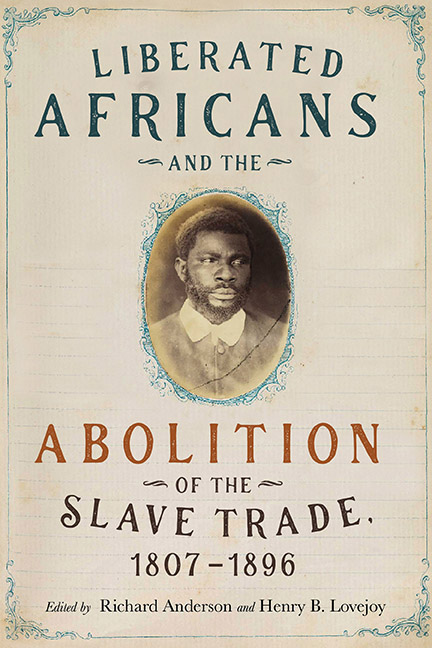Book contents
- Frontmatter
- Dedication
- Contents
- List of Illustrations
- Acknowledgments
- Introduction: “Liberated Africans” and Early International Courts of Humanitarian Effort
- Part One Origins of Liberated Africans
- Part Two Sierra Leone
- Part Three Caribbean
- Part Four Lusophone Atlantic
- Part Five Liberated Africans in Global Perspective
- Part Six Resettlements
- Bibliography
- Notes on Contributors
- Index
11 - Producing “Liberated” Africans in Mid-nineteenth Century Angola
Published online by Cambridge University Press: 21 March 2020
- Frontmatter
- Dedication
- Contents
- List of Illustrations
- Acknowledgments
- Introduction: “Liberated Africans” and Early International Courts of Humanitarian Effort
- Part One Origins of Liberated Africans
- Part Two Sierra Leone
- Part Three Caribbean
- Part Four Lusophone Atlantic
- Part Five Liberated Africans in Global Perspective
- Part Six Resettlements
- Bibliography
- Notes on Contributors
- Index
Summary
On 25 March 1807, Great Britain outlawed its nationals from participating in the Atlantic slave trade, which they had overwhelmingly dominated during the previous century. Over the following decades, Britain successfully pressed other Western states to enact similar bans for their respective nationals. Enforced by naval squadrons patrolling the coast of western Africa, these successive prohibitions resulted in the “rescue” of one hundred fifty thousand to two hundred thousand individuals who otherwise would have continued their forced migration into slavery in the Americas. Neither free nor slave, but ambiguously in between both legal conditions, the experiences of liberated Africans ironically developed far more akin to slavery than to freedom. A relatively large body of scholarship exists on these Africans “liberated” from the bowels of vessels engaged in the illegal Atlantic slave trade. The extant scholarly literature, however, is largely concerned with the “liberated” African captives who emanated from Great Britain's preponderant role in enforcing the ban on Atlantic slaving and subsequently found themselves in various British Overseas Territories. Far less scholarly attention has, in turn, been devoted to enslaved Africans “liberated” under other contexts, who ended up in quite different landscapes.
The Portuguese colony of Angola is one of these. The question of liberated African slaves, or libertos as they were known in this particular landscape, has largely escaped scholarly investigation. While the role of Portugal in abolishing the slave trade from and slavery within the colony of Angola is relatively well studied, scholarly work dealing specifically with the libertos who emerged from this process is sparse. Moreover, the few scholars of the Angolan past who have paid some attention to the question of libertos have not always agreed as to when and under what circumstances they emerged. While indicating, half a century ago, that “the abolition of slavery came slowly in Portuguese Africa and was foreshadowed by a number of decrees and proposals,” James Duffy posited that they arose in 1854 from “a limited abolition decree by Prime Minister Sá da Bandeira [that] became law.” Some years later, Douglas L. Wheeler pointed to an earlier development, following the 1844 establishment of the Anglo-Portuguese Mixed Commission and Court of Arbitration for the Slave Trade in Luanda.
- Type
- Chapter
- Information
- Publisher: Boydell & BrewerPrint publication year: 2020
- 1
- Cited by



